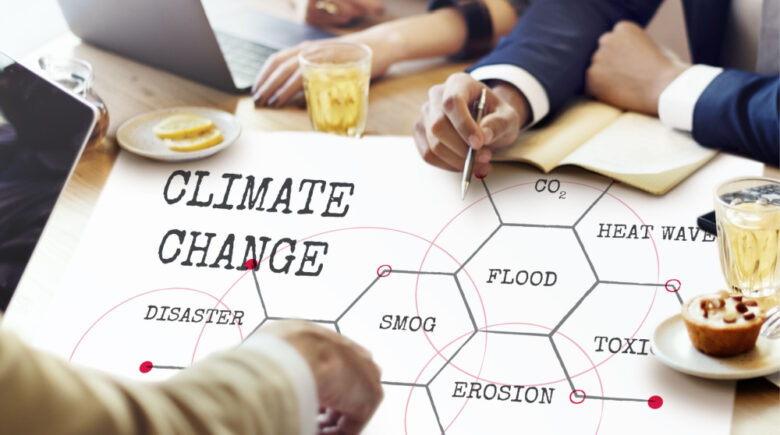There is no doubt that the planet is experiencing a climate change crisis. The urgency to act and implement policies that prevent or mitigate the imminent crisis cannot be overstated. The threat of climate change to our planet is real and already here with us. The evidence is there: extreme weather events, rising sea levels, extreme temperatures, frequent wildfires, and droughts are just a tip of the many indicators of the climate change crisis.
The time to act is now, as further delays will continue making the planet uninhabitable and unsustainable.
The climate crisis has created many other challenges. The good news is that the world is also in a better position to create and implement interventions than ever. We have the technology, the expertise, and the resources to avert this crisis. Governments all over the world have everything it takes to transition to sustainable energy economies, protect and restore the forest cover, and use research and development to create innovative solutions. However, these interventions must be incentivized by a supportive policy and legal framework that holds accountable individuals and institutions destroying the environment and contributing to the climate change crisis.
The pace of climate change is alarming. Some weather events that occurred once in a long time are becoming the new norm. Every year brings us a multitude of new records globally. 2016 remains the hottest year on record so far. Surprisingly, the last decade has seen the eight warmest years in history. China experienced the worst severe heatwave in six decades in 2022.
The United States has experienced some of the worst droughts in the last two decades. Hurricane Sandy, which left 44 people dead, and property and infrastructure worth billions of dollars destroyed in New York City in 2012, stands as one of the worst Atlantic hurricanes in history. [3] These catastrophic events have occurred in the last two decades, showing the weight of the escalating climate crisis.
It is not a coincidence that we were warmed by scientists years back about most of the extreme weather events happening today. Human activities have contributed to the crisis we are experiencing today in many ways. Years of deforestation, industrial air and soil pollution, plastic waste, and other unsustainable practices have led us to where we are today. Surely, we have no excuse to wait for more wildfires, hurricanes, droughts, and torrential floods to know that time is running out. Any further delays in taking action will only lead to increased social, economic, and environmental costs of addressing the climate crisis.
Fixing the climate crisis might seem like a luxury to some people when there are other urgent problems, such as unemployment, inflation, and budget deficits. The reality is that there are many good reasons why the world should transition to a more sustainable economy. A sustainable economy will lead to efficient use of resources, reduce greenhouse emissions, create a healthy economy, and enjoy better growth and innovation. These benefits will not be realized if the climate change crisis is ignored.
The World Must Mitigate and Adapt to Climate Change
The window of climate resilience is closing faster than imagined. Besides impacting the environment, climate change triggered by human activities severely affect infrastructure and landscapes. The world has witnessed a significant rise in the patterns and frequency of extreme weather events, disrupting critical infrastructures such as power and telecommunication networks. A good example is the power outages experienced in February 2021 in Texas.
The frig temperatures during that month were blamed for the power grid crisis, and the inefficiencies of the power plants during extreme cold were exposed. Urgent and efficient interventions must be implemented to slow the adverse impacts of climate change and adapt to new norms.
Deliberate actions must be taken to mitigate climate change. Some of the deliberate actions include reducing carbon emissions and transitioning to clean energy. Significant efforts in the transportation sector, one of the biggest contributors to carbon emissions, are taking shape with the introduction of electric vehicles. But much need to be done because the uptake of these vehicles is still low. Again, coal is still used in electricity generation, which means the problem is far from over. There is an urgent need to transition from emission-heavy fuels such as diesel and coal, which produce greenhouse gases, to renewable and sustainable energy sources. The planet would be safer if all its energy came from renewable sources such as wind and solar. But since we have yet to reach this point, we must mitigate and adapt to the changes.
The World Needs a Plan
The COP27 held in Egypt in 2022 was an opportunity for world leaders to show their ambition and urgency to address the climate crisis. However, this might have turned out as a missed opportunity. Though there was a pledge to keep global temperatures rising under 1.5 degrees, there was no clear plan to achieve that. There was no definite plan to get rid of fossil fuels. But must acknowledge that COP27 saw many countries commit to cutting methane and reforming food systems. A fund for “loss and damage” was created to see rich countries take responsibility for the high contribution to emissions, whose impacts are heavily felt in poor countries.
The planet is feeling the impacts of the climate crisis from all corners. Extreme weather events such as droughts, floods, hurricanes, and extreme temperatures have shown us how worse it is to get. The time to take corrective actions is now. We should not wait nor delay, as the consequences will be catastrophic. With clear measures, it is possible to overcome the climate crisis being witnessed, but it requires commitment from major economies. Several summits such as Kyoto Protocol have been organized to enable the world leadership to discuss how to combat climate crisis, but commitment remain critical with strategies and policies outlined.
There is no doubt that the planet is experiencing a climate change crisis. The urgency to act and implement policies that prevent or mitigate the imminent crisis cannot be overstated. The threat of climate change to our planet is real and already here with us. The evidence is there: extreme weather events, rising sea levels, extreme temperatures, frequent wildfires, and droughts are just a tip of the many indicators of the climate change crisis.
The time to act is now, as further delays will continue making the planet uninhabitable and unsustainable.
The climate crisis has created many other challenges. The good news is that the world is also in a better position to create and implement interventions than ever. We have the technology, the expertise, and the resources to avert this crisis. Governments all over the world have everything it takes to transition to sustainable energy economies, protect and restore the forest cover, and use research and development to create innovative solutions. However, these interventions must be incentivized by a supportive policy and legal framework that holds accountable individuals and institutions destroying the environment and contributing to the climate change crisis.
The pace of climate change is alarming. Some weather events that occurred once in a long time are becoming the new norm. Every year brings us a multitude of new records globally. 2016 remains the hottest year on record so far. Surprisingly, the last decade has seen the eight warmest years in history. China experienced the worst severe heatwave in six decades in 2022.
The United States has experienced some of the worst droughts in the last two decades. Hurricane Sandy, which left 44 people dead, and property and infrastructure worth billions of dollars destroyed in New York City in 2012, stands as one of the worst Atlantic hurricanes in history. [3] These catastrophic events have occurred in the last two decades, showing the weight of the escalating climate crisis.
It is not a coincidence that we were warmed by scientists years back about most of the extreme weather events happening today. Human activities have contributed to the crisis we are experiencing today in many ways. Years of deforestation, industrial air and soil pollution, plastic waste, and other unsustainable practices have led us to where we are today. Surely, we have no excuse to wait for more wildfires, hurricanes, droughts, and torrential floods to know that time is running out. Any further delays in taking action will only lead to increased social, economic, and environmental costs of addressing the climate crisis.
Fixing the climate crisis might seem like a luxury to some people when there are other urgent problems, such as unemployment, inflation, and budget deficits. The reality is that there are many good reasons why the world should transition to a more sustainable economy. A sustainable economy will lead to efficient use of resources, reduce greenhouse emissions, create a healthy economy, and enjoy better growth and innovation. These benefits will not be realized if the climate change crisis is ignored.
The World Must Mitigate and Adapt to Climate Change
The window of climate resilience is closing faster than imagined. Besides impacting the environment, climate change triggered by human activities severely affect infrastructure and landscapes. The world has witnessed a significant rise in the patterns and frequency of extreme weather events, disrupting critical infrastructures such as power and telecommunication networks. A good example is the power outages experienced in February 2021 in Texas.
The frig temperatures during that month were blamed for the power grid crisis, and the inefficiencies of the power plants during extreme cold were exposed. Urgent and efficient interventions must be implemented to slow the adverse impacts of climate change and adapt to new norms.
Deliberate actions must be taken to mitigate climate change. Some of the deliberate actions include reducing carbon emissions and transitioning to clean energy. Significant efforts in the transportation sector, one of the biggest contributors to carbon emissions, are taking shape with the introduction of electric vehicles. But much need to be done because the uptake of these vehicles is still low. Again, coal is still used in electricity generation, which means the problem is far from over. There is an urgent need to transition from emission-heavy fuels such as diesel and coal, which produce greenhouse gases, to renewable and sustainable energy sources. The planet would be safer if all its energy came from renewable sources such as wind and solar. But since we have yet to reach this point, we must mitigate and adapt to the changes.
The World Needs a Plan
The COP27 held in Egypt in 2022 was an opportunity for world leaders to show their ambition and urgency to address the climate crisis. However, this might have turned out as a missed opportunity. Though there was a pledge to keep global temperatures rising under 1.5 degrees, there was no clear plan to achieve that. There was no definite plan to get rid of fossil fuels. But must acknowledge that COP27 saw many countries commit to cutting methane and reforming food systems. A fund for “loss and damage” was created to see rich countries take responsibility for the high contribution to emissions, whose impacts are heavily felt in poor countries.
The planet is feeling the impacts of the climate crisis from all corners. Extreme weather events such as droughts, floods, hurricanes, and extreme temperatures have shown us how worse it is to get. The time to take corrective actions is now. We should not wait nor delay, as the consequences will be catastrophic. With clear measures, it is possible to overcome the climate crisis being witnessed, but it requires commitment from major economies. Several summits such as Kyoto Protocol have been organized to enable the world leadership to discuss how to combat climate crisis, but commitment remain critical with strategies and policies outlined.




